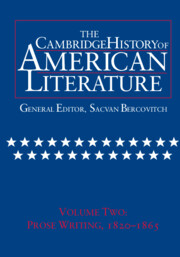Book contents
- Frontmatter
- Introduction
- CONDITIONS OF LITERARY VOCATION
- THE LITERATURE OF EXPANSION AND RACE
- THE TRANSCENDENTALISTS
- NARRATIVE FORMS
- 1 Establishing National Narrative
- 2 Local Narratives
- 3 Personal Narratives
- 4 Literary Narrative
- 5 Crisis of Literary Narrative and Consolidation of National Narrative
- Chronology
- Bibliography
- Index
1 - Establishing National Narrative
from NARRATIVE FORMS
Published online by Cambridge University Press: 28 March 2008
- Frontmatter
- Introduction
- CONDITIONS OF LITERARY VOCATION
- THE LITERATURE OF EXPANSION AND RACE
- THE TRANSCENDENTALISTS
- NARRATIVE FORMS
- 1 Establishing National Narrative
- 2 Local Narratives
- 3 Personal Narratives
- 4 Literary Narrative
- 5 Crisis of Literary Narrative and Consolidation of National Narrative
- Chronology
- Bibliography
- Index
Summary
Of the american writers from the mid-nineteenth century whose names are still recognized today, the majority are writers of prose narrative, such as Cooper, Poe, Hawthorne, Melville, and Stowe. Beyond these better-known writers, others will also appear in these pages, for the canon changes, and some writers who have never before, or not recently, played a significant part in American literary histories now seem important, such as the historians George Bancroft and Francis Parkman and the abolitionist Frederick Douglass. From the 1820s through the 1860s American prose narrative was produced and distributed within an increasingly established, yet conflict-ridden, publishing business, as Michael Bell shows in this volume. Narratives arose from, responded to, and contributed to continental and overseas expansion, racial struggles, and political debates, and elsewhere in this volume Eric Sundquist has detailed this complex process. But the production of narratives in a culture may be seen not only as a function of other institutions and structures but also as an institution that has a history and structure of its own, relatively independent of these others. Such a relatively internal history, in which the fundamental organizing terms are drawn from literary analysis rather than from economic or social analysis, is the work of this section. For in this period writers of prose narratives helped to form a definition of literature that still exerts power now.
- Type
- Chapter
- Information
- The Cambridge History of American Literature , pp. 605 - 628Publisher: Cambridge University PressPrint publication year: 1995

